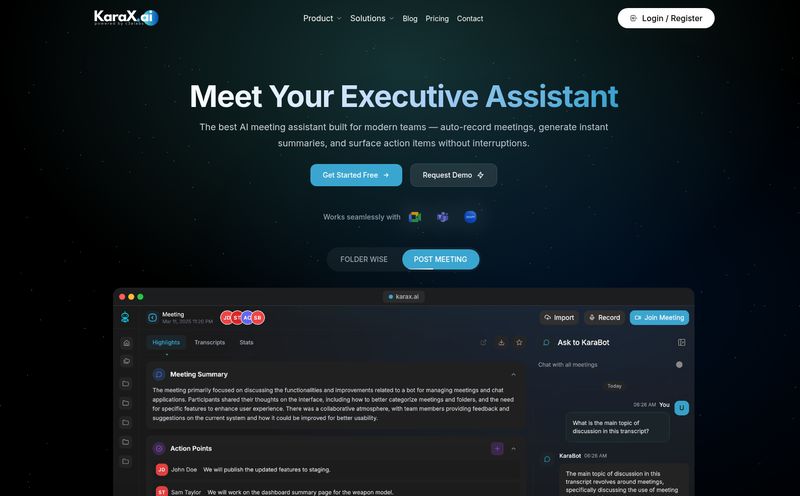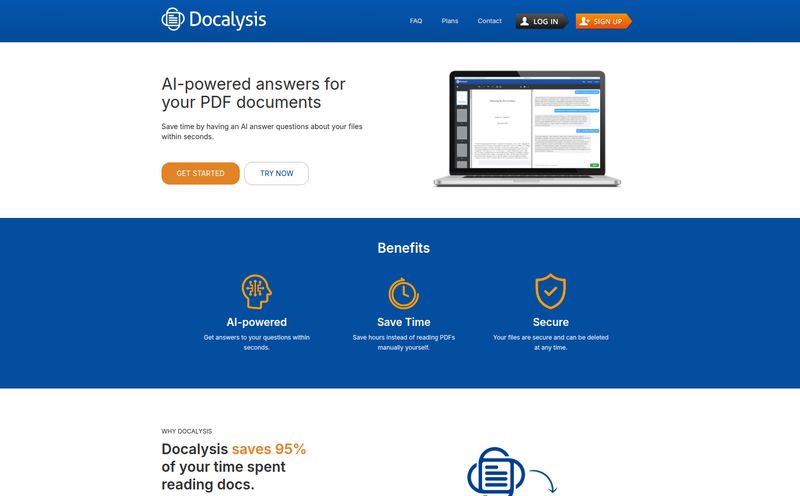For years, I’ve been wading through the digital marketing trenches, and if there's one thing I’ve seen promise the world and deliver a dial-up modem, it’s the chatbot. We’ve all been there. You land on a site, a little box pops up with a chipper, “Hello! How can I help you today?” and you know, you just know, that any question more complicated than “Where is the pricing page?” will send it into a robotic tailspin of “I’m sorry, I don’t understand.”
It's been a running joke in the industry. But lately, things have started to shift. The big AI boom has trickled down, and a new generation of tools is emerging, all claiming to have cracked the code. They promise AI that’s less... well, artificial.
So when a tool described as an “Online AI chatbot and chat generator” floated across my desk, my curiosity was piqued. I’ll call it Converly for our purposes today. The promise is familiar: build a smarter, more intuitive chat experience for your website. But the real question is, does it move the needle? Or is it just another clunky script in a prettier box?
So, What Exactly Is an AI Chat Generator Anyway?
Before we go further, let's clear something up. We're not talking about the old-school, rule-based chatbots. You know the ones. They operate on a strict “if-then” logic. If a user types “pricing,” then show the pricing link. They are basically glorified, interactive FAQs. They have their place, sure, but they’re about as flexible as a brick.
Modern AI chat generators are a different beast entirely. They run on the same kind of tech that powers things like ChatGPT—large language models (LLMs) and sophisticated Natural Language Processing (NLP). This means they aren't just matching keywords. They’re designed to understand context, intent, and even sentiment. A user can misspell a word, use slang, or ask a rambling, multi-part question, and the AI should be able to keep up.
A generator platform, then, is the tool that lets you, the business owner or marketer, build and train one of these AI brains for your own website, often without needing to write a single line of code. Think of it as a control panel for your very own digital customer service agent.

Visit Bagoodex
The Big Promises of a Tool Like Converly
Since specifics on Converly itself are a bit thin on the ground, let’s talk about what a tool like this needs to deliver to be worth a damn in today’s market. Based on my experience, it boils down to a few critical things.
NLP That Doesn't Make You Want to Scream
This is the big one. The absolute deal-breaker. A modern AI chatbot has to understand how real people talk. We don't speak in perfect, SEO-optimized keywords. We say things like, “Hey, uhm, my order hasn’t shown up yet, any idea where it is?” A good AI needs to parse that, identify the core issue (missing order), and know to ask for an order number. A bad AI will reply, “I’m sorry, I don’t understand ‘uhm’.” And honestly who has time for that.
Lead Generation That Feels Natural
I’ve always felt the best marketing is the kind that doesn’t feel like marketing. A chatbot shouldn’t just be a defensive support tool; it should be your best, most patient salesperson. It can qualify leads by asking gentle, conversational questions. “Just so I can point you in the right direction, are you a small business or a larger enterprise?” It can book demos, collect email addresses for a newsletter, or guide a user to the perfect product based on their needs. It turns a passive visitor into an engaged prospect.
Customization That Doesn't Require a PhD
Most of us aren’t developers. We're marketers, shop owners, creators. A top-tier AI chat generator should let you customize the bot’s personality. Do you want it to be witty and fun? Or professional and straight-to-the-point? You should be able to “feed” it your website content, your product docs, and your FAQs, and it should learn from them to create a knowledge base. All of this, ideally, through a clean, drag-and-drop style interface.
Let's Talk Money: The Pricing Puzzle
Ah, pricing. The million-dollar question. I couldn't find a public pricing page for Converly, which is a bit of a pet peeve of mine, but it’s not uncommon in the B2B SaaS world. They often want you to book a demo first. Annoying, but standard practice.
However, we can talk about typical pricing models for these kinds of tools. They usually fall into one of these buckets:
- Freemium Model: You get a basic bot with limited chats per month for free. It’s a great way to test the waters, but the branding is usually the provider’s, and features are stripped down.
- Tiered Subscriptions: The most common model. You’ll see plans like “Starter,” “Pro,” and “Business.” The price increases with the number of monthly chats, the number of bots you can build, and access to advanced features like CRM integrations or detailed analytics. Prices can range from $20/month for a solopreneur to hundreds or even thousands for an enterprise.
- Pay-as-you-go: Less common, but some platforms charge per conversation. This can be cost-effective for sites with very low, but important, traffic.
My advice? Always look for a free trial. You need to see how the bot actually performs with your audience before you commit any real budget.
Is an AI Chatbot Actually Good for SEO?
This is a question I get a lot. Does adding a chatbot to your site help you rank better on Google? The answer is... indirectly, yes. A chatbot itself isn't a ranking factor. Google’s crawlers aren’t having conversations with your bot to decide if your site is worthy.
But think about the secondary effects. A good chatbot improves the user experience. It keeps people on your site longer (increasing dwell time). It helps them find what they need faster (reducing bounce rate). These are user engagement signals that Google pays close attention to. A recent Zendesk report showed that a huge percentage of customers expect immediate responses online. A chatbot delivers that.
A well-implemented AI chat assistant from a platform like Converly can make your site stickier and more helpful. And what’s helpful for users is almost always helpful for SEO.
So, Is Converly a Game Changer?
Without a hands-on test, it's impossible to give a final verdict. It exists in a crowded marketplace with heavy hitters like Intercom, Drift, and Tidio. To stand out, it can’t just be “good.” It needs to be exceptionaly intuitive, surprisingly human, and priced competitively.
The very idea of an easy-to-use AI chat generator is compelling, though. It represents a move toward democratizing powerful AI for everyone, not just massive corporations. It’s about giving the little guy the tools to provide world-class customer service, 24/7. And that’s a trend I can definitely get behind.
Frequently Asked Questions (FAQ)
- 1. Can an AI chatbot completely replace human customer service?
- No, and it shouldn't. The best strategy is a hybrid one. Let the AI handle the common, repetitive questions (order status, feature explanations, etc.). This frees up your human agents to deal with the complex, sensitive, or high-value customer issues that require a real human touch.
- 2. Is it difficult to set up an AI chatbot on my website?
- It depends on the platform, but most modern generators like the one we're discussing are designed to be user-friendly. Typically, it involves adding a small snippet of Javascript to your site’s code—a process most website platforms like WordPress or Shopify make very easy.
- 3. How does the AI learn about my specific business?
- You “train” it. Good platforms allow you to upload documents, provide links to your website pages (like the FAQ or 'About Us' page), and manually add question-and-answer pairs. The AI digests all this information to create its knowledge base, so its answers are specific to you.
- 4. Will a chatbot slow down my website?
- A well-coded chatbot widget should have a minimal impact on your site's performance. They are typically loaded asynchronously, meaning they load separately from the main content of your page, so they shouldn't affect your core loading times. It's always a good idea to test your page speed before and after installation, though.
- 5. What's the difference between a chatbot and a live chat?
- A chatbot is an automated program (AI) that answers questions. Live chat connects a visitor directly to a real human agent in real-time. Many platforms offer a combination, where a chatbot initially fields the query and can escalate the conversation to a human if it gets stuck or the user requests it.
Final Thoughts
The chatbot world is finally getting interesting. We're moving away from the clunky, frustrating experiences of the past and into an era where these digital assistants can be genuinely helpful. While the jury is still out on Converly specifically, the promise it represents is real. The ability to offer instant, intelligent, 24/7 support and lead generation without a massive team is a powerful proposition for any online business.
My final take? Don't be scared of the bots. Embrace them. But be picky. Find one that feels less like a robot and more like a really, really helpful employee. Your customers—and your bottom line—will thank you for it.



